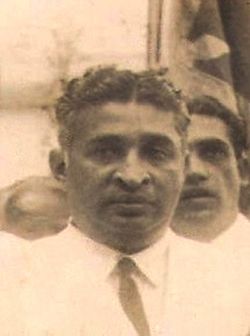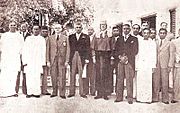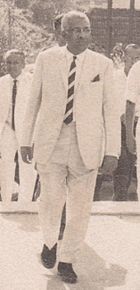Dudley Senanayake facts for kids
Quick facts for kids
Dudley Senanayake
|
|
|---|---|
 |
|
| 2nd Prime Minister of Ceylon | |
| In office 26 March 1952 – 12 October 1953 |
|
| Monarch | Elizabeth II |
| Preceded by | Don Stephen Senanayake |
| Succeeded by | John Kotelawala |
| In office 21 March 1960 – 21 July 1960 |
|
| Monarch | Elizabeth II |
| Preceded by | Wijeyananda Dahanayake |
| Succeeded by | Sirimavo Bandaranaike |
| In office 25 March 1965 – 29 May 1970 |
|
| Monarch | Elizabeth II |
| Preceded by | Sirimavo Bandaranaike |
| Succeeded by | Sirimavo Bandaranaike |
| 4th Leader of the Opposition | |
| In office 5 August 1960 – 17 December 1964 |
|
| Prime Minister | Sirimavo Bandaranaike |
| Preceded by | C. P. de Silva |
| Succeeded by | Sirimavo Bandaranaike |
| Member of the Ceylon Parliament for Dedigama |
|
| In office 14 October 1947 – 10 April 1956 |
|
| Succeeded by | Maitripala Herath |
| In office 19 March 1960 – 13 April 1973 |
|
| Preceded by | Maitripala Herath |
| Succeeded by | Rukman Senanayake |
| Personal details | |
| Born | 19 June 1911 British Ceylon |
| Died | 13 April 1973 (aged 61) Colombo, Sri Lanka |
| Nationality | Sri Lankan |
| Political party | United National Party |
| Alma mater | Corpus Christi College, Cambridge |
| Occupation | Politician |
| Profession | Barrister |
Dudley Shelton Senanayake (born June 19, 1911 – died April 13, 1973) was an important Sri Lankan leader. He served as the Prime Minister of Ceylon (which is now Sri Lanka) three times. His first term was from 1952 to 1953, then briefly in 1960, and finally from 1965 to 1970. He was also the Leader of the Opposition from 1960 to 1964.
As Prime Minister, Dudley Senanayake focused on improving farming and education. He also believed in working closely with Western countries. He came from a well-known political family. His father, D. S. Senanayake, led the movement for Sri Lanka's independence. Dudley followed in his father's footsteps, becoming a lawyer before entering politics. He was first elected to the State Council in 1936.
After his father's sudden death, Dudley Senanayake became the second Prime Minister of Ceylon. He later resigned due to health reasons. He returned to politics in 1957 and served two more terms as Prime Minister. During his last term, he started big projects like the Mahaweli Development programme, which helped develop the country. He remained a Member of Parliament until his death in 1973.
Contents
Early Life and Family Background
Dudley Senanayake was born on June 19, 1911. His family was very wealthy and was becoming active in politics during the time Sri Lanka was a British colony. His grandfather, Mudaliyar Don Spater Senanayake, built the family's wealth through graphite mining. He also invested in plantations and the arrack (a type of alcohol) business.
Dudley's parents were Don Stephen Senanayake and Molly Dunuwila. He was the oldest child and had a younger brother named Robert. His father, D. S. Senanayake, along with his uncles, were involved in the temperance movement. This movement encouraged people to drink less alcohol.
After his uncle's early death, D. S. Senanayake became more involved in politics. He became a lawmaker and later led the independence movement. This movement helped Ceylon gain self-rule in 1948. His father became the first Prime Minister of Ceylon and founded the United National Party. Dudley would be a member of this party for his whole life. Dudley grew up in a comfortable family home called Woodlands. He was deeply affected when his father and uncles were arrested during the 1915 Ceylonese Riots by British soldiers. They faced the risk of execution under martial law.
Dudley Senanayake never married and remained single throughout his life.
Education and Learning
Dudley went to S. Thomas' College for his high school education. He was an excellent student and also good at sports. He was the Head Prefect, which is like a student leader. He captained the college cricket team and also played hockey, boxed, and did athletics. He won the Victoria Gold Medal for being the best student at S. Thomas'.
After college, Senanayake went to Corpus Christi College, Cambridge in England. He studied Natural Sciences there. After graduating, he became a barrister, which is a type of lawyer, at the Middle Temple in London.
Political Journey
Starting in the State Council
After finishing his studies, Dudley returned to Ceylon in 1935. He became a lawyer for the Supreme Court of Ceylon. However, his father encouraged him to enter politics. In 1936, he was elected to the State Council from the Dedigama area. The State Council was a governing body during the colonial period. He served there for ten years.
As a State Councillor, he worked hard to develop his area. He helped build roads, hospitals, schools, and police stations. He also became involved with the Ceylon National Congress (CNC), which pushed for Ceylon's independence. In 1946, he took over his father's role as Minister of Agriculture and Lands.
Minister of Agriculture and Lands
As Minister of Agriculture, Dudley continued many farming projects his father had started. One important project was the Minneriya irrigation project, which helped bring water to farms. In 1947, he was elected to the first parliament of independent Ceylon. His father, D. S. Senanayake, became the first Prime Minister, and Dudley was appointed Minister of Agriculture and Lands in his cabinet.
He continued to work on agricultural projects. He started the big Gal Oya Project, which provided water for over 120,000 acres of land. He also introduced a guaranteed price for paddy, which helped farmers.
Becoming Prime Minister for the First Time
Dudley was still the agriculture minister when his father died suddenly. On March 26, 1952, Dudley was chosen to be the Prime Minister by the Governor-General Lord Soulbury. This was a surprise to many. He called for a general election, and his party, the UNP, won.
However, his government became unpopular in 1953 when the price of rice was increased and government help (subsidies) was cut. This led to protests known as the Hartal 1953. Dudley Senanayake resigned as Prime Minister in October 1953 due to health reasons. He then stepped away from politics for a while.
Returning to Politics
In 1954, Dudley returned to public life. He was appointed President of the United National Party (UNP) in 1957. He supported efforts to create trade unions for the UNP and opposed the government's plan to take over insurance companies and the Colombo port.
After a period of political unrest, elections were held in March 1960. The UNP managed to form a government, and Dudley Senanayake became Prime Minister again. However, this government lasted only four months. He resigned after new elections were held, and the UNP won fewer seats. He then became the Leader of the Opposition from 1960 to 1964. He helped bring about early elections in 1965 by convincing some members of the ruling party to switch sides.
Third Term as Prime Minister
Dudley Senanayake was able to form a government after the 1965 elections. He served his longest term as Prime Minister, from March 1965 to May 1970. His government included six other parties, bringing together both Tamil and Sinhalese leaders.
During his time, he worked to control occasional community violence. He also gave official status to the Tamil language in Tamil-speaking areas. This was an important step to address the concerns of the Tamil community. He made Poya, the Buddhist holy day, a public holiday. He also recognized the Mahanayaka theros, who are important Buddhist monks. He set up a university for Buddhist monks in Anuradhapura.
He made many changes to education. He expanded vocational training by setting up the Ceylon College of Technology in 1966 and six Junior University Colleges in 1969.
In 1966, his government claimed there was an attempted coup d'état. The army commander and several military people were arrested. They were later found not guilty.
Dudley Senanayake's government is praised for helping Sri Lanka's economy. He started planning for the biggest construction project in Sri Lanka, the Mahaweli Development programme. His government also helped the tourist industry grow, which later became very important for the country's economy and jobs. However, he and his allies lost the 1970 elections.
Later Life and Passing Away
In the 1970 elections, Dudley Senanayake's party, the UNP, won the most votes individually. However, a group of parties called the United Front won a large majority of seats. This meant Sirimavo Bandaranaike became Prime Minister again.
Dudley Senanayake kept his seat in parliament for Dedigama. Even though he remained active in politics, he did not take the position of Leader of the Opposition due to his health. He allowed J. R. Jayewardene to take that role.
Dudley Senanayake passed away on April 13, 1973, at the age of 61. He was still a Member of Parliament at the time. He had suffered from a stomach problem since his college days, which worsened under stress.
His Legacy
Dudley Senanayake is remembered by most Sri Lankans as a simple and fair leader. He is known for continuing his father's work, especially in farming reforms and large projects. He also started new projects like the Mahaweli development programme. His foreign policy favored Western countries, but he also kept good relations with countries like China.
Statues of Dudley Senanayake have been put up in many places in Sri Lanka, including one near the Old Parliament Building, Colombo. Many schools, libraries, and public buildings are named in his honor. His funeral took place at Independence Square.
Electoral History
| Election | Constituency | Party | Votes | Result | |
|---|---|---|---|---|---|
| 1936 state council | Dedigama | Independent | Elected | ||
| 1947 parliamentary | Dedigama | United National Party | 20,170 | Elected | |
| 1952 parliamentary | Dedigama | United National Party | 21,206 | Elected | |
| 1960 (March) parliamentary | Dedigama | United National Party | 12,208 | Elected | |
| 1960 (July) parliamentary | Dedigama | United National Party | 13,340 | Elected | |
| 1965 parliamentary | Dedigama | United National Party | 17,987 | Elected | |
| 1970 parliamentary | Dedigama | United National Party | 24,436 | Elected | |
See also
- List of political families in Sri Lanka
- Don Stephen Senanayake
- Rukman Senanayake



